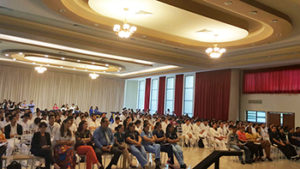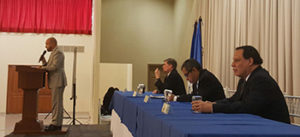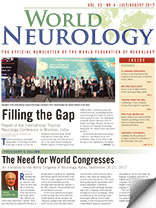By John D. England, MD

John D. England
Government and health officials met June 20-23 in Tegucigalpa, Honduras, to discuss the current global situation regarding the Zika virus and the current situation in the Americas.
Participating were representatives from the Pan American Health Organization (PAHO), UNICEF, Universidad Nacional Autonoma de Honduras (UNAH), the World Health Organization (WHO), and the WFN. They met with government officials from Honduras, health care professionals, public health officials from other countries in Central America, South America, and the Caribbean, and dignitaries from the French government.

Students, residents, and professors from the Medical Sciences of the National Autonomous University of Honduras attended the Zika meeting June 20-23 in Tegucigalpa, Honduras.
Three members of the WFN Task Force on Zika (Dr. Tarun Dua from the WHO, Dr. Marco Medina from UNAH, and I) attended the meeting. The specific countries that were represented at the meeting were Costa Rica, the Dominican Republic, El Salvador, Guatemala, Honduras, Nicaragua, and Paraguay.
A large part of the meeting was devoted to developing proactive programs and the dissemination of measures for the care and support of people and families affected by complications associated with the Zika virus. Speakers and the other participants re-emphasized that the major complications of the Zika virus infection are the congenital Zika virus syndrome and Guillain-Barre syndrome. However, it was noted that other neurological complications, such as meningoencephalitis, myelitis, and sensory polyneuropathies, have also been reported.
Although the Zika virus does not appear to be spreading as aggressively as in previous years, the virus is still infecting large population segments in the affected regions. The WHO estimates that nearly 100 million people, and more than 1 million pregnant women in the Americas, could be infected, suggesting that tens of thousands of children may have the congenital Zika virus syndrome.
Pilot Programs

(From left) French Ambassador Dr. Pierre Christian, Dr. John England, Julio Raudales, and Marco Medina during the Zika meeting.
As more cases of the Zika virus infection emerge, there is a great need to strengthen health systems to enhance surveillance and to provide improved care and programs in the affected countries. The Honduran government, in association with the Institut Francais, PAHO, UNAH, UNICEF, the WHO, and the WFN, has stepped to the forefront of these efforts to institute pilot programs to help patients and families. Health care representatives from other Central American countries also are interested in joining these efforts.
The WHO help is central to the success of these efforts. Much work has already been done by the WHO to provide the information and tools that are necessary to provide a systems approach to fulfill these goals. A major part of the meeting in Honduras centered on discussions about the WHO Toolkit for the care and support of people affected by complications associated with the Zika virus.
The toolkit serves as a blueprint to enhance country and health care systems’ preparedness for Zika virus outbreaks and its complications. The WHO Toolkit consists of three manuals, each with several modules. There are separate manuals for public health planners and managers, health care professionals, and community workers. All participants agreed that the general principles outlined in the toolkit would help in developing comprehensive care and psychosocial support mechanisms for people affected by the Zika virus. There also was recognition and consensus that the toolkit would have to be adapted to fit the unique national and regional needs and context prior to formal implementation.
Participants pledged to plan future meetings and collaboration with health ministers and government officials from their respective countries and regions with the goal of instituting as many of the recommendations as possible. All participants recognize that governmental and health care system commitments and financial support are necessary to ensure the success of these efforts.
There also is hope that providing the resources and infrastructure for patients affected by the complications of the Zika virus will serve as a model for providing care and support of patients affected by other diseases in these countries and regions.
All of the participating organizations, including the WFN, pledged continuing support of these important goals in global health. Only by working together will there be success in these areas of public health.
John D. England, MD, is the chair of the WFN Task Force on Zika. He also is editor-in-chief of the Journal of the Neurological Sciences.
